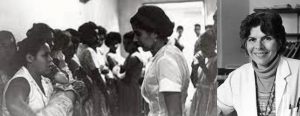Helen Rodriguez Trias
WORD OF THE DAY
PERSONAL CONTEXT
HISTORICAL CONTEXT
SUCCESS PRINCIPLE
CIVICS LESSON
Click below to listen to audio:
UNIFY TO SOLVE PROBLEMS
. . . the experiences of my own mother, my aunts and sisters, who faced so
many restraints in their struggle to flower and reach their own potential.
Helen Rodriguez-Trias, on what inspired her
Because of her singular commitment to expand health care access to all women regardless of their ethnic or economic background, Helen Rodriguez-Trias was a founding member of both the Women’s Caucus and the Hispanic Caucus of the American Public Health Association, eventually being elected president of the association in 1993, the first Latina to hold the position. During the previous decade Rodriguez-Trias served as medical director of the New York State Department of Health AIDS Institute. Her entire career as a physician and educator was characterized by her passionate advocacy for healthcare rights of underprivileged women and children in the U.S. as well as in Central and South America, Africa, Asia, and the Middle East. Her exceptional efforts were recognized in January 2001 when she received the Presidential Citizen’s Medal.
Through her activism she raised a unifying voice, proclaiming the truth that problems are best solved by people working together. Her principle-driven words point the way for your problemsolving through unity as you:
FOCUS ON THE PROBLEM
I think my sense of what was happening to people’s health was that it was really determined by what was happening in society — by the degree of poverty and inequality you had.
Rodriguez-Trias traveled throughout the world to address health inequities. Wherever she went, she remained focus on the link between a woman’s income level and her healthcare access. Focus on the root problems and you will
FIND THE COMMON GROUND
I began to understand that we were coming to different conclusions because we were living different realities. The women’s movement has been successful only to the extent that it shares experience, finds common ground, and fights for the same thing.
While working in the Bronx in the 1970s, Rodriguez Trias encouraged underprivileged women to share their experiences to bring greater unity to the movement for better health care. Unifying people will build momentum towards achieving your goals; it will lead you to
FORMULATE FAIRNESS
We need health, but above all we need to create a grounding for healthy public policy that redresses and salvages the growing inequities. We cannot achieve a healthier us without achieving a healthier, more equitable health care system, and ultimately, a more equitable society.
Follow Rodriguez’s example. Make your ultimate goal fairness for all, and it will be easier for you to
FLOURISH WITH EACH OTHER
I am proud that I made my contribution in moving forward that dialogue among many women, a dialogue that took place over many years. We had to listen to each other; we had to find out each other’s reality.
Rodriguez Trias stressed the importance of listening to women from all ethnic and socioeconomic backgrounds to understand their medical needs, as a first step in meeting those needs. Listen/Understand/Act — it’s a good strategy for you to use; it will make you strong enough to
FIGHT FOR EVERYONE’S WELL-BEING
I hope I’ll see in my lifetime a realization that we are one world. No one is going to have quality of life unless we support everyone’s quality of life . . . it’s our collective and personal health that’s at stake.
Rodriguez Trias’ fought against the health disparities between wealthy and low-income women as well as those faced by women of color. Battle for everyone’s well-being. It’s the best way to foster unity.
KEY POINTS
WORD OF THE DAY
Disparity – a great difference; a situation in which two or more things are not equal or similar, especially when this is thought to be unfair.
PERSONAL CONTEXT
The daughter of Puerto Rican immigrants, Rodiguez-Trias was born in New York City in 1929 and spent her early years in Puerto Rico. When she was ten years old, her family returned to New York City, where she suffered discrimination. Though she spoke English and had good grades, Rodriguez-Trias was placed with students with learning disabilities. She transformed her situation by performing so well in a poetry recital that she was moved to a class with gifted children. She excelled academically, earning her medical degree from the University of Puerto Rico in 1960.
HISTORICAL CONTEXT
To address health care disparities in the Latino community, Rodriguez-Trias resolved early in her career to work at Lincoln Hospital. She was the head of the department of pediatrics; many of her patients were from the largely Puerto Rican section of the South Bronx, one of the lowest income demographics of the U.S. during that era. Rodriguez-Trias became an advocate against sterilization abuse among poor women and women of color. She was aware of one study that documented from 1938 to 1968 a third of Puerto women of child-bearing age being sterilized without being fully informed of its consequences. Rodriguez-Trias became a founding member of the Committee to End Sterilization Abuse and helped to draft federal sterilization guidelines that required a woman’s written consent to sterilization.
SUCCESS PRINCIPLE
See Success Principle Worksheet
CIVICS LESSON
See Civics Lesson Worksheet


